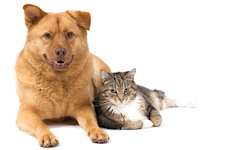 |
You are receiving this e-mail as a part of your subscription to Dr. Jones' newsletter, 'Veterinary Sec.rets'. See subscription information below. |
| |
|
 Hello Friend, Hello Friend,
Hi to you and your furry friends this Wednesday.
------------------------------
Simple and Easy Steps
------------------------------
I have many pet owners wanting to be more involved with their pet's care, BUT reluctant to start.
Go here, and get my BEST Books, Reports and Videos for less than $10
http://www.theonlinevet.com/innercircle.php
----------------------------------------
Jessie losing his vision
----------------------------------------
Jessie was my father's dog- and now he is part of my family. He's a 12 year old Portuguese Water Dog cross??? who has a propensity to chase fast moving outdoor creatures ( look out squirells)
But as he is getting older his vision is getting worse.
He can't always see the treats thrown for him.
And he has a hard time recognizing people a short distance away.
It appears his vision is going.
I performed a brief exam, and his has a noticeable whiteness in the center of his eyes.
Cataracts- likely normal aging changes going on with the lens, in veterinary terms called lenticular sclerosis.
It's a very common finding with older pets- perhaps you have had a similar experience.
In most cases it means subtle vision loss, and this is usually more noticed at nights ( under lower light)
While I was practicing, I would typically tell clients in this situation to monitor the changes, and not do much at all.
Rapidly forming advanced cataracts are different- they can lead to complete blindness, and they have different causes ( ie diabetes)
-----------------------------------
Cataract options
-----------------------------------
Fortunately there are some holistic options, and I am trying some of these on Jessie now.
SUPPLEMENTS. The antioxidants Vitamin E (dose is 100 IU per 10 lbs) and Vitamin C (dose is 100 mg per 10 lbs), plus specific flavonoids, such as Quercetin (dose is 25 mg per 10 lbs) or bilberry (dose is 1 capsule per 10 lbs), may be helpful for cases of allergic eye infections and cataracts
CINERARIA. Has been effective in reducing the size of some cataracts and decreasing cataract formation. To make a sterile eye solution, purchase sterile saline from a pharmacy. Using the tincture dilute the mixture with 1/2 saline and 1/2 cineraria. Apply 1 drop twice daily to the affected eye, being careful not to contaminate the eyedropper. This must be used for 3 months before evaluating its effectiveness.
CHRYSANTHEMUM. This can be found as a Chinese remedy called Ju Hua. It is safe for both dogs and cats. The dose is 1/4 teaspoon per 10 lbs of the dried herb twice daily. Another Chinese herbal formula called HACHIMIJIOGAN is shown to slow cataract progression.
//////////////////////////////////////////////

P.S. I'll give you and update on Jessie's cataracts in a few months.
P.P.S. To get access to ALL of my At Home Remedies for a very low price, go here:
http://www.theonlinevet.com/innercircle.php
Heal Your Pets At Home!
Best Wishes,
Dr Andrew Jones

DISCLAIMER: This information is for educational purposes only and is not intended to replace the advice of your own veterinarian. Dr Andrew Jones resigned from the College of Veterinarians of B.C. effective December 1 2010, meaning he cannot answer specific questions about your pet's medical issues or make specific medical recommendations for your pet.
PRIVACY POLICY: We will never rent, sell, loan, provide, barter, exchange or in any way make available your personal information to others. You can unsubscribe or change your email address at any time using the links at the bottom of this email.
Copyright 2010 Four Paws Online Ltd.
Tel: 1-800-396-1534
Fax: 1-888-398-1378
www.veterinarysecretsrevealed.com
support@veterinarysecretsrevealed.com
|
|
|
|